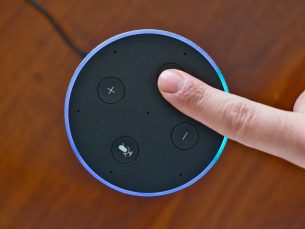
For years, researchers have grappled with understanding the relationship between technology and political behavior, proposing various models to explain how exposure to information and engagement with technology shapes citizens’ attitudes and actions. These models, however, have often yielded conflicting results, leaving unanswered questions about the true nature of this relationship.…
Read more
University of Florida College of Journalism and Communications (UFCJC) Advertising faculty, doctoral students and alumni were recognized at the 2024 American Academy of Advertising (AAA) Annual Conference in Portland, Oregon, from March 14-17. Yuan Sun, UFCJC Advertising assistant professor, was the co-recipient of a 2024 AAA Research Fellowship to study…
Read more
A new study has found that virtual influencers are perceived as less authentic across all product types. The findings by University of Florida College of Journalism and Communications (UFCJC) doctoral student Fanjue Liu and UFCJC Media Production, Management and Technology Associate Professor Yu-Hao Lee are featured in “Virtually Authentic: Examining…
Read more
A new study has found that frequent consumption of artificial intelligence (AI)-related news amplifies political discussion about AI and leads to increased AI literacy and support of AI policies and regulation. The findings by University of Florida College of Journalism and Communications (UFCJC) doctoral students Fanjue Liu and Heidi Makady,…
Read more
Four University of Florida College of Journalism and Communications (UFCJC) faculty and two doctoral students are included in the Research Handbook on Artificial Intelligence (AI) and Communication edited by Seungahn Nah, Dianne Snedaker Chair in Media Trust and research director of the UF’s Consortium on Trust in Media and Technology.…
Read more
As advancements in technology reshape the advertising world, the use of virtual influencers is on the rise. Virtual influencers are computer-generated image (CGI) characters on social media that post and interact with followers, just like humans. Some brands are using these virtual influencers as endorsers in place of human influencers.…
Read more
The COVID-19 global pandemic has been referred to as “the loneliness epidemic.” At the height of quarantine and social distancing, loneliness and isolation permeated society. With limited human interaction, many people turned to voice assistants for connection. According to a 2020 Adobe survey, 39% of voice assistant users began using…
Read more
A new study demonstrates that peoples’ social motivations for using voice assistants have a significant influence on how they perceive voice assistants’ character, persona and role. The findings by University of Florida College of Journalism and Communications doctoral student Fanjue Liu were featured in “Hanging Out with My Pandemic Pal:…
Read more
Artificial Intelligence is now being used to help tutor students at all educational levels. AI tutors can enhance learning outcomes such as facilitating various teaching-learning practices within and outside the classroom, supporting students 24/7, and providing students from economically disadvantaged areas access to all kinds of learning materials without being…
Read more
The field of human-machine communication (HMC) has grown exponentially over the past 10 years with the advancement of new artificial intelligence technology. Research on HMC, which has become increasingly interdisciplinary, has also exploded focusing on both the technology itself and the implications for society. University of Florida College of Journalism…
Read more
The use of smart speakers, such Alexa and Google Assistant, has become ubiquitous in American society. As of 2020, one in three people in the United States used smart speakers for a variety of daily tasks, such as online shopping, e-mail, language translation, and searching for information, as well as…
Read more
University of Florida College of Journalism and Communications Media Production, Management and Technology faculty members Kun Xu, assistant professor in Emerging Media, and Sylvia Chan-Olmsted, professor and Media Consumer Research director, and doctoral student Fanjue Liu are the co-authors of “Smart Speakers Require Smart Management: Two Routes From User Gratifications…
Read more